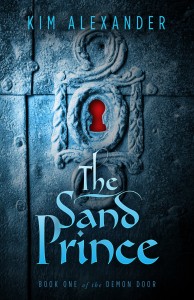Q: Every book has its own story about how it came to be conceived and written as it did. How did this book evolve?
An image. I was in bed, falling asleep, and I suddenly had a vivid image of two people sitting at a campfire. The girl had white hair and was in a party dress, and the man had red eyes. I knew she’d been kidnapped, but I also knew she wasn’t afraid of him. I had to figure out who they were and how they got there. That’s where it came from.
Q: Do you write with any particular audience in mind? Are there any particular audiences you hope will connect with this story?
Yes, I’d like it if everyone who plunked down coin for Game of Thrones would give me a shot. (kidding/not kidding.) I wrote this for myself. I am hoping that people who liked things like The Princess Bride, The Last Unicorn, Dune, the Sookie Stackhouse series–things that I personally love–might go for it.
Q: What is your next project?
Well, I am in the finishing stages of book two (spoiler: shit gets real) which is both easier because I don’t have to do so much exposition, but also much harder in that with about 40 named characters it’s become quite complicated. It’s about to head to the rough and dangerous waters of my editor. (Whom I love. Bow down before Carly Bornstein and speak her name with reverence.) And I am plotting out the third book in the series. I think there will be four, but who knows?
Q. What is the first book you read that made you think, “I have got to write something like this someday!”
I’ve read F/SF my whole life, but it was reading Dave Barry’s columns in the Miami Herald. They were funny and light and impermanent (this was before PCs, folks) but they made me realize you could leave a mark on the world with your words.
Q. Are there any new books or authors in science fiction or fantasy (or both!) have you excited? What are you reading right now?
I’ve vastly slowed down in my reading, and I’m trying to stay away from my own genre. When I was doing author interviews at my old job at Sirius XM, I would read about 3 books a week, cover to cover. The writers were always amazed I’d read their books, but I felt it was unfair to them and to the audience not to do so. Since I am out there doing my own thing and just reading for pleasure now, I’m giving my brain a break. I am getting ready to start Ancillary Justice, though, and I just finished the new Clive Barker, The Scarlet Gospels. His writing is so seductive. And I’ll stop drop and roll for anything by China Mieville.
Q. Are you a pantser (someone who writes by the seat of their pants) or a plotter?
Total pantser. I write the chapters completely out of order, as they occur to me, and try and jigsaw them together after. So, a LOT of rewriting!
Q. What are you reading at the moment?
Girl’s Guide to the Apocalypse by Daphne Lamb, she’s a fellow Booktrope author and a hilarious person.
Q. What made you choose science fiction/ fantasy as your means of expression?
Didn’t have a choice. I don’t know that you can force yourself to write in a genre that doesn’t call to you. At least, I can’t.
Q. How did you learn to write?
I mentioned my old gig at Sirius XM. I got to ask the most successful and talented writers in the world how to write, and they were generous with their time and advice. But it comes down to: Start. Write. Fix it later. And rewrite. Rinse, repeat. (And don’t use adverbs!)
Q. Do you adhere to any particular writing regimen?
I turn off my phone, put a cat on my lap, and off I go. I’m pretty disciplined.
Q. Tell us everything about your book and why you love it!
My hero is a half-human demon prince with a drinking problem and social anxiety disorder.
(This is a somewhat difficult book to summarize!)
It’s a story about finding out where you belong- and since it’s a fantasy, my rather beleaguered hero has multiple worlds to choose from.
Here’s the blurb:
When the storm came, it was made of magic, not rain, and when it had passed, the life and the city Hellne knew were changed forever.”
In Kim Alexander’s debut novel she weaves a witty, epic fantasy brimming with diverse characters and plenty of intrigue.Two worlds On the war-ravaged demon world of Eriis, Hellne, the fierce young queen, fights to keep her people alive, and to keep her son’s parentage a secret. On the green and gentle human world of Mistra, the demons have faded into myth. Only a handful of old men and children still guard The Door between the worlds.
Bound by magic Rhuun, the Prince of Eriis, uncovers a sultry book written by a human, sparking an obsession with the other world. When he is forced to flee Eriis, he must travel through The Door or pay the price in blood. Divided by a door The humans of Mistra are not what Rhuun was expecting—and one insufferable young woman in particular is about to find out that the demons of Eriis are not mythological after all . . .
As we quickly discover, the book that Rhuun loves so much and bases his entire knowledge of the human world on, turns out to be a cheesy romance novel. (You get to read his book, The Claiming of the Duke, as you go along, and that was a blast to write.) So he has some catching up to do when he goes through The Door.
Writing fantasy really gave me the freedom to do some comedy, a little romance, some sex for the grown folks, and loads of world building. (I should mention that The Sand Prince is not a romantic comedy, although it has romance and comedy!)
I didn’t want to use a medieval-ish backdrop, so I put the humans in a city very much like Washington DC (my home) called Mistra. (They use horses and gas-light, but they have indoor plumbing and photography.) The demon kingdom of Eriis is a once-great, now half-demolished city in a really unpleasant desert. But people live there, and have children. This is their home. I got to think about children growing up, and what they think is normal, and what they take for granted. Also, a good friend challenged me to create a world without homophobia, and I think I’ve done that. There is a large cast, and I love them all (even the bad guys) and relish the chance to get inside their heads. Because no matter the setting, the world, or how bizarre or outlandish the situation, they have to be human first. (Rhuun, being only half human, might disagree, and his mother, the demon queen would send me to the Crosswinds for saying that, but I stand by it!)
Author Links:
Kim Alexander Website
Facebook
Twitter
Pinterest
Google+
~~~
Kim’s book will be available on Amazon Tuesday, November 3rd, which is today, so go buy it! I’ll be writing a review later on, because it was a damned good book and I’m DYING for the second one to get published!


